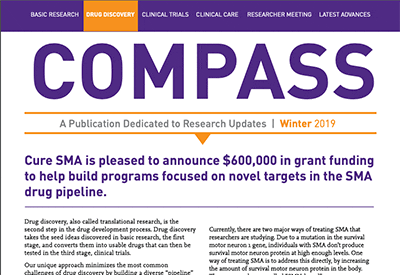“Although still preclinical, these results demonstrate how SMN2 splicing modifiers could correct the molecular deficit that causes SMA,” said Luca Santarelli, Head of Neuroscience, Ophthalmology and Rare Diseases at Roche. “This study represents an important step towards developing a potential therapeutic option for this devastating and currently untreatable condition. Early clinical trials are currently underway to determine the safety and tolerability of this approach.”
“The investigational compounds used in this study represent the first orally available SMN2 splicing modifiers for SMA,” commented Stuart W. Peltz, CEO of PTC Therapeutics, Inc. “Using the experience and expertise in RNA biology we have gained at PTC over the last 16 years, we used our alternative splicing technology to identify and subsequently optimize investigational compounds that target the SMN2 splicing to produce the SMN protein. Our unique partnership with Roche and the SMA Foundation has allowed this project to rapidly move into clinical development.”
The study used chemical screening and optimization to identify orally available small molecules that selectively alter the splicing of the SMN2 pre-mRNA to produce stable full-length SMN protein. The SMN2 splicing modifiers described in the Science article penetrated into all mouse tissues tested, including brain, spinal cord and muscle, and thus improved SMN2 RNA splicing to increase SMN protein production in these disease-relevant tissues. As a result of the SMN protein increase, the compounds prevented the progression of SMA in a severe mouse model. These compounds also corrected SMN2 RNA splicing and increased SMN protein levels in cell cultures obtained from SMA patients, including stem cell-derived motor neurons. A Phase I clinical program to assess safety and tolerability with investigational compounds was initiated in early 2014.
“The findings of this preclinical study contribute significantly to our understanding of SMA and provide further evidence suggesting that our strategy to upregulate SMN with small molecules could be effective,” said Loren Eng, President of the SMA Foundation. “We are proud to have seeded this important work – we believe it could have a meaningful impact on the lives of patients who suffer from SMA.”
The drug is currently being tested in Phase I clinical trials, and PTC also provided an update on their trial results.
In January 2014, a Phase 1a single ascending dose, placebo-controlled clinical trial in healthy volunteers was initiated. The primary objectives of this trial were to explore safety and pharmacokinetics of the drug candidate, RG7800. This trial has now completed and a multiple dose clinical trial in SMA patients is currently in preparation. Preliminary findings in the Phase 1a study indicate that RG7800 was well-tolerated at all dose levels studied. There were no deaths, serious adverse events (SAEs) or withdrawals due to adverse events (AEs) and no dose-related trends were identified. Additionally, RG7800 demonstrated a dose-dependent effect on SMN2 splicing, as shown by a change in the ratio of full-length SMN2 mRNA to SMN2 mRNA without exon 7 (SMND7), which may be interpreted as proof of mechanism in terms of the expected pharmacodynamic effect.



